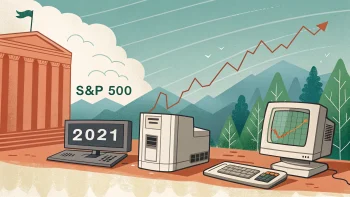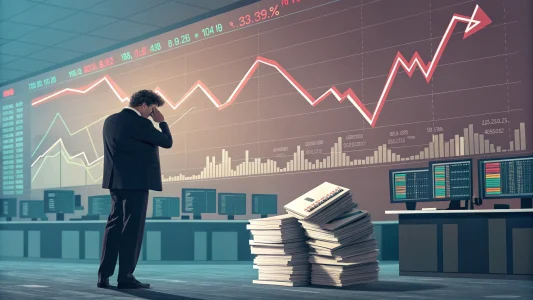Have you logged into your 401(k) account lately and felt your stomach drop? You’re not alone. Many Americans are rattled by the recent stock market plunge following President Trump’s new tariffs.
On April 4, after China retaliated against President Trump’s tariffs, the Dow dropped 2,231 points, or 5.5%. Meanwhile, the S&P 500 fell 5.97%. In tech-heavy Nasdaq, shares dropped 5.82%. In addition, the Nasdaq closed down over 20% from its December record high, marking the first bear market since 2022.
Suffice it to say that you may feel panicked when you see your retirement savings dip, whether you are approaching retirement or just starting out.
But before you make any sudden moves, let’s take a collective deep breath.
Despite tariff-driven declines looking scary in the short term, you don’t necessarily need to overhaul your retirement plan just because the market is volatile. Amid economic uncertainty, here are some smart strategies for protecting your 401(k). And, just as importantly, what you should avoid.
Table of Contents
ToggleUnderstanding What’s Happening
It is common for markets to react negatively and swiftly when new tariffs are introduced — especially those that impact significant economies like China or the EU. Often, tariffs signal trade wars, higher business costs, lower consumer confidence, and slower global growth. As a result, the stock market suffers as company profits decline.
But here’s the thing. In some cases, short-term pain does not necessarily mean long-term loss. Historically, markets have always bounced back from crises, and investors who stay the course tend to do well over time.
What To Do With Your 401(k) When the Market Gets Rocky
So, what should you do with your 401(k) when the market gets bumpy? Well, let’s break it down for you.
Keep calm and stick to your plan: Your anchor in a storm.
Imagine yourself sailing a ship in a storm. The waves crash, and the wind howls. Without a clear plan, you should never suddenly change your course. It’s precisely what happens when you panic sell during a market downturn.
Christine Benz, a seasoned financial expert at Morningstar, puts it perfectly: “Resist the urge to shift out of stocks entirely.” Why? “Such a move could buy you some short-term relief, but it will soon be replaced by another nagging worry: Is it time to get back in?”
Rather, revisit your original investment strategy. Was it developed keeping your financial goals and risk tolerance in mind? If yes, your best plan is usually to stay the course. Don’t forget that you’ll be doing this for the long run.
Rebalance if necessary, but don’t overreact: Fine-tune your sails.
401(k)s are like sailboats. To reach your retirement destination (market growth), you’ve placed your sails (your asset allocation). Occasionally, however, the wind shifts and your sails need to be adjusted. This is where rebalancing comes in.
By rebalancing, you bring your portfolio back to its original asset allocation. For instance, if stocks are down, they might make up less of your portfolio. As a result of rebalancing, you can buy low (buy more stocks that are down) and sell high (get rid of some of the overvalued assets).
Do not, however, get trigger-happy. You should rebalance your portfolio annually or semi-annually, not whenever the market sneezes. 401(k) plans typically offer a rebalancing feature that can be adjusted manually or automatically.
Ensure you keep contributing (especially if you’re getting a matching contribution).
Suppose your favorite store was having a massive clearance sale. That’s essentially how a stock market downturn works. If you contribute during a downturn, you can buy shares at a lower price. This strategy, known as dollar-cost averaging, often pays off in the long run.
Be sure to take advantage of your employer’s match as well. This is free money; even in a volatile market, it still has value.
“Just keep the momentum going,” advises Sarah Behr, a registered investment advisor and founder of Simplify Financial Planning. “Compounding interest is a really powerful function in retirement, and if you miss the compounding interest because you took 10 years off during the recession, you might miss a big recovery. And you have a chance to buy low with the expectation that it will return at some point in the future.”
Avoid putting all your eggs in one basket: Diversify your portfolio.
You are more vulnerable to market shocks if your 401(k) is heavily invested in one sector or fund. It is like putting all your eggs in one basket; if the basket falls, all your eggs will be lost. As such, you need diversification as a safety net.
As such, diversify your investments across different asset classes (stocks, bonds, international markets, etc.). This will better prepare you to deal with the impact of market declines in one particular area. For example, consider exploring opportunities in international markets if you are heavily invested in U.S. stocks.
Increasing bond allocations near retirement: Smooth sailing into retirement.
In the years leading up to retirement (within five years), you might want to allocate a greater portion of your 401(k) to bonds or funds with stable values. As a result, they are generally less risky than stocks and can help protect your savings during periods of market stress.
However, don’t go overboard. It is possible to limit your growth potential if you move too much too soon. It all comes down to finding the right balance. As Jon DeMoss, a wealth advisor with Mission Wealth, suggests, “Maybe you adjust the risk level down a tad, but you really should consult a professional.”
Stay focused on what you can control: Your financial lighthouse.
It’s easy to feel helpless when the market is chaotic. But that’s not the case. You can control your budget. Additionally, you can save more money by spending less. You can invest those savings in a high-yield account, Treasuries, or money market funds. As a result, you have peace of mind and won’t be tempted to make rash decisions regarding your retirement savings.
You can also control when you make purchases. If tariffs increase the price of items, consider delaying large, non-essential purchases.
What NOT to Do With Your 401(k): Avoiding the Shipwrecks
Now let’s talk about what you shouldn’t do.
Avoid panic selling and jumping ship.
This is the golden rule. When the market is down, selling is like jumping from a plane without a parachute. By locking in losses, you are missing out on possible rebounds.
Remember the 2008 financial crisis? After selling their holdings for fear, investors watched the market recover and surpass its previous highs.
Beware of trying to time the market: You’re not a fortune teller.
Despite everyone’s desire to buy low and sell high, it is nearly impossible to predict the exact bottom or top of the market. Studies show that underperformance is usually caused by market timing.
Instead, adopt a disciplined, long-term strategy. If you’re nervous, make gradual, rather than drastic, changes your allocations.
Don’t borrow from your 401(k) out of fear: A dangerous shortcut.
The idea of taking a loan from your 401(k) might seem like a quick solution, but it is rarely a good idea. It’s especially true if you’re under 59 ½ since most 401(k)s charge an early withdrawal penalty. In addition, you miss out on market rebounds, and your loan might become due immediately if you leave your job.
Consider other options if you’re in a financial crisis. An emergency savings account, for example, could be tapped. If covered, HSAs (Health Savings Accounts) can be used for medical expenses. A personal loan can be worth considering if you have good credit and can get a favorable interest rate.
Individuals could withdraw from their Roth IRA as an alternative when faced with an emergency expense or other unexpected expenses.
Don’t ignore your 401(k) entirely: Stay engaged, not obsessed.
When the market is turbulent, it’s tempting to “set it and forget it.” However, ignoring your 401(k) entirely may result in missed opportunities for rebalancing, diversification, and more intelligent decisions.
To verify your 401(k) still aligns with your goals, check in every few months rather than every day.
Staying calm, sticking to your plan, and avoiding common pitfalls can help weather market storms.
What Historical Patterns Tell Us
Throughout history, stock markets have survived wars, recessions, elections, policy changes, and, yes, even tariffs.
For example;
- In the aftermath of the 2018-2019 escalation of the U.S.-China trade war, markets dropped sharply but recovered within a few months.
- The stock market plunged in 2020 due to the COVID-19 crash. But by the end of the year, most indexes had returned to record highs or were close to them.
Although history doesn’t repeat itself exactly, it often rhymes. In the short term, a market plunge caused by tariffs may hurt. But unless you let fear guide your decisions, it’s unlikely to ruin your long-term retirement plans.
A Word on Emotions and Investing
You know this — and you are totally entitled to feeling uneasy right now. We all do. After all, your 401(k) is your future. However, emotional investing tends to result in poor decisions. Rather than panicking every time the Dow dips, consider talking to a financial advisor about setting up a more conservative allocation that you can sleep with.
Don’t forget that investing doesn’t mean avoiding all risks but managing them wisely.
Final Thoughts: Use This Moment to Get Smarter
Even though the headlines may scream doom, moments like these can actually be used to;
- Take a second look at your financial goals.
- Identify your risk tolerance and fine-tune it.
- Understand how the market works by educating yourself.
- Establish better habits, such as automatic contributions or portfolio reviews.
Every dip reminds us that markets rarely move in straight lines and tend to go up over time. Your 401(k) isn’t just about this month or this year. We can build a secure future for ourselves and our families by making smart daily decisions.
FAQs
My 401(k) balance has dropped significantly. Should I sell everything and move to cash?
This is a classic “don’t” scenario. When your hard-earned savings evaporate, it’s easy to react emotionally. However, recovering your losses is impossible if you sell everything during a downturn. It is important to remember that 401(k)s are designed for long-term growth. Also, historically, markets have recovered.
Instead, you should;
- Stay calm and stick to your long-term plan.
- Rebalance your portfolio.
- Consider Dollar Cost Averaging.
With tariffs impacting specific sectors, should I shift my 401(k) investments away from those areas?
It’s understandable to be concerned about sector-specific effects. Despite this, avoid drastic, knee-jerk responses to short-term events.
The best course of action would be;
- Review your portfolio’s diversification.
- Consult with a financial advisor.
- Research broadly diversified funds.
I’m nearing retirement. Should I delay my retirement due to the market downturn?
It depends on your circumstances, such as;
- The income you need for retirement.
- Other sources of income (e.g., Social Security, pensions).
- Your risk tolerance.
- How long do you have before you can withdraw the funds?
You should also consider;
- Calculate your retirement income. Doing this lets you determine whether you can still meet your income needs.
- If you want to retire gradually rather than abruptly, consider a phased retirement.
- Adjust your withdrawal strategy. In the early years of retirement, you might need to withdraw a smaller percentage of your portfolio.
Are there any investment opportunities I should be looking at during a downturn?
Be cautious when investing in “bargains.” However, you can take advantage of the following opportunities;
- Invest in quality companies with strong fundamentals and a history of weathering economic hardship.
- Consider value investing. In this strategy, you purchase undervalued shares that have a high potential for growth in the long run.
- Diversification is essential, even in downturns.
How can I stay informed without getting overwhelmed by market news?
It’s essential to stay informed. Nevertheless, you should avoid allowing the market to dictate your decisions.
Instead, you should;
- Don’t trust anything but reputable financial news outlets.
- Instead of catching up in daily market fluctuations, focus on long-term trends.
- Instead of constantly monitoring the market, set aside specific times to check it.
- Keep your long-term goals in mind. Short-term market actions do not determine the long-term success of a well-built portfolio.
Image Credit: Kindel Media; Pexels

















